AI in Entertainment: Top Use Cases Driving Innovation in 2025
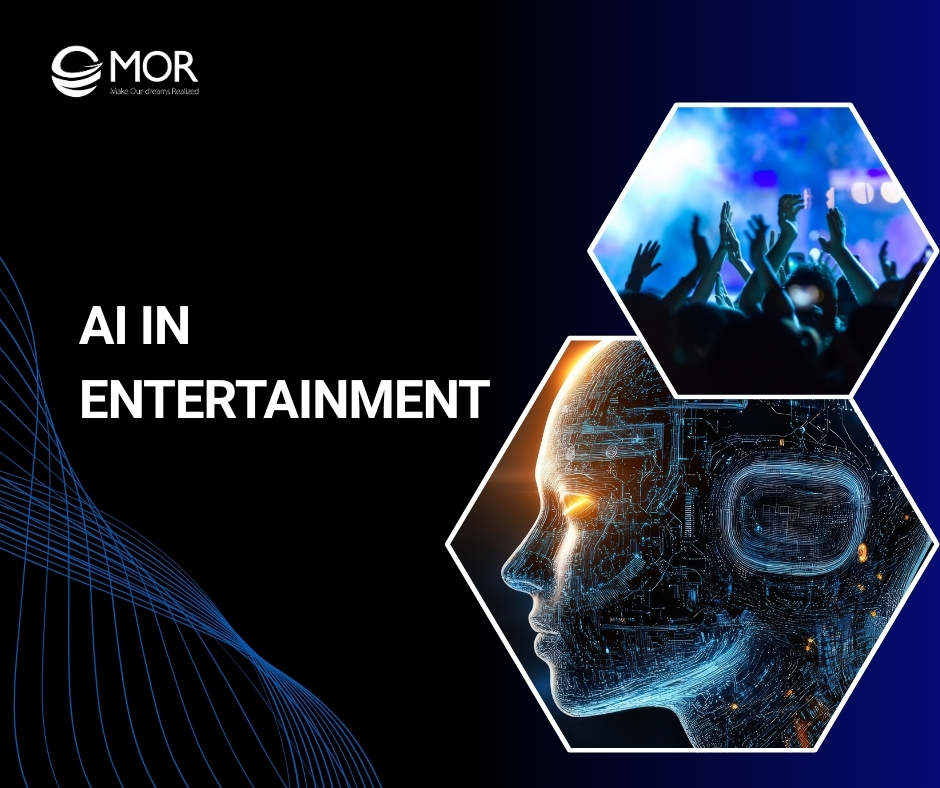
The rise of AI in entertainment is redefining how audiences experience music, film, gaming, and beyond. As demand grows, companies across the AI in entertainment industry face pressure to innovate while keeping costs under control. This MOR Software’s guide shows how AI is reshaping media and entertainment and highlights key trends for 2025.
The Role Of AI In Entertainment And Media
The role of AI in entertainment has become undeniable, reshaping how companies produce, deliver, and personalize content. Across the AI in entertainment industry, businesses are using intelligent systems to refine operations, improve audience experiences, and open creative possibilities that were once limited by time and resources.
As a measure of scale, the AI in media and entertainment market was about $26 billion in 2024 and is on pace to nearly $100 billion by 2030 at roughly 24% annual growth.
A primary area where AI is making a difference is in content creation. Algorithms now sift through massive datasets to craft content that resonates with specific audiences. Streaming platforms like Netflix rely on machine learning to recommend movies and shows, while media firms such as Jukin Media and Storyful scan user-generated content to pinpoint videos likely to go viral.
Beyond curation, new forms of digital talent are emerging, including virtual influencers and AI-driven characters, showing how far automation can extend creativity.
AI is also enriching the consumer experience within entertainment platforms. Chatbots are increasingly common, handling customer inquiries and solving issues quickly, while voice recognition tools allow users to manage their entertainment hands-free. Popular AI-powered assistants, including Alexa and Google Assistant, are now part of entertainment ecosystems, giving users the ability to search, play, and control media simply with voice commands.
Reflecting this shift to the living room, YouTube reports viewers now watch more than 1 billion hours of YouTube on TVs each day, and TV is its primary device in the U.S. These practical applications highlight how AI is used in entertainment to create smoother and more natural interactions between users and technology.
Personalization is another defining aspect of AI’s presence in AI in media and entertainment. From curated playlists on music apps to video recommendations on streaming platforms, algorithms deliver suggestions tailored to each user’s habits. In gaming, adaptive systems keep players engaged by adjusting difficulty levels to suit individual skills, ensuring longer play sessions and more immersive experiences.
Efficiency gains are equally noteworthy. Automated tools now support animators by enhancing the realism of 3D models, while AI-powered music tools speed up soundtrack composition. Video editors, writers, and marketers all benefit from AI automation in editing, proofreading, and ad copy generation. These innovations save both time and costs, increasing productivity across the sector.
Finally, AI is driving smarter marketing and stronger engagement strategies. Data-driven insights allow businesses to target advertisements with greater accuracy and measure campaign performance in real time. Social media analysis tools reveal consumer trends and online reach more effectively than traditional methods.
PwC projects the entertainment and media market will reach $3.5 trillion by 2029, with AI-enhanced digital advertising growing in share. Digital formats rising from 72% of ad revenue in 2024 to 80% by 2029 and connected-TV ads alone forecast at $51 billion.
Combining personalization with advanced analytics, AI strengthens the connection between creators and audiences, proving its influence across the AI in media industry. The momentum of AI in the entertainment industry continues to grow, and in the next section we’ll dive deeper into specific use cases shaping the future.
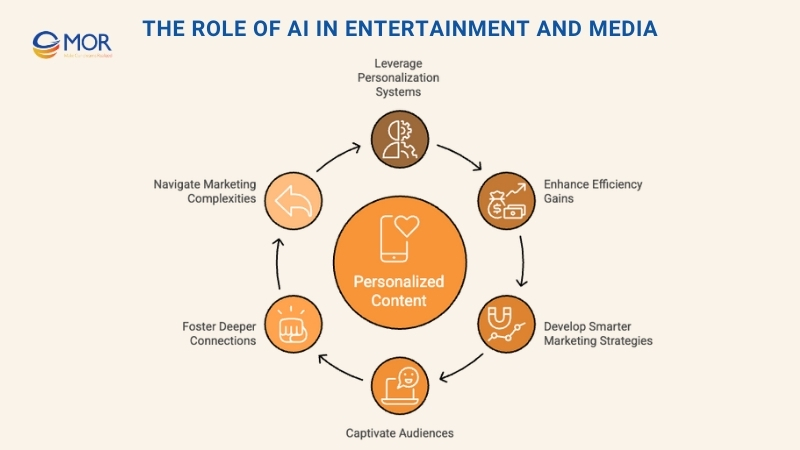
Key Use Cases Of AI In Entertainment
The influence of AI in entertainment stretches across multiple creative domains. From music and film to gaming, advertising, book publishing, and digital storytelling, intelligent systems are redefining how media is produced, distributed, and consumed.
Each area demonstrates how automation and creativity can work hand in hand, transforming traditional practices into smarter, more interactive experiences. These varied applications highlight the versatility of AI use cases in media and entertainment, opening new opportunities for both creators and audiences.
Music
Music is one of the earliest areas where AI in entertainment industry has shown its potential. From composing new tracks to tailoring playlists, intelligent systems are reshaping how music is created and enjoyed.
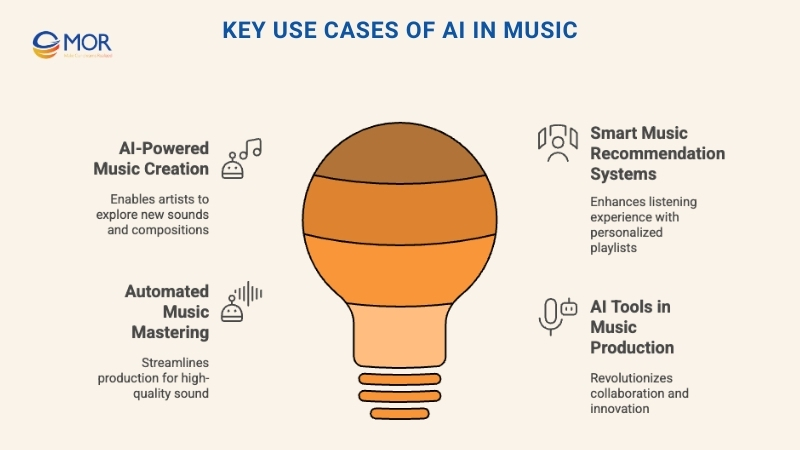
AI-Powered Music Creation
AI is now composing original songs by analyzing vast libraries of musical data. Algorithms trained on countless tracks learn rhythm, melody, and harmony patterns across genres, then generate unique compositions that mirror human creativity.
While some listeners praise the novelty of these creations, others note differences in emotional resonance compared to human-made works. Still, this blend of data-driven design and artistry marks a new frontier for AI in media and shows how technology can complement traditional music production.
Smart Music Recommendation Systems
Recommendation engines have become central to the listening experience. These systems process data such as listening history, user preferences, and even time of day to suggest playlists or tracks that feel personalized. Streaming platforms like Spotify employ machine learning to deliver custom mixes based on genre, artist, or mood.
Tailoring suggestions so precisely, AI keeps listeners engaged longer, proving its value not only in personalization but also in strengthening audience loyalty across the AI in entertainment examples we see daily.
Automated Music Mastering
The arrival of AI in audio mastering has reshaped a once highly specialized process. Traditionally, mastering required expert engineers in dedicated studios, focusing on polishing sound quality and catching imperfections. Today, intelligent platforms make this stage more accessible. Services such as LANDR apply algorithms to analyze tracks and adjust dynamics, frequencies, and tonal balance.
This allows independent artists and newcomers to access professional-grade mastering at a fraction of the cost. The debate remains around whether AI-assisted mastering can fully replicate the depth achieved by human specialists, yet it undeniably improves speed, affordability, and accessibility across the AI in entertainment industry.
AI Tools In Music Production
Beyond mastering, AI in entertainment plays a growing role in full-scale music production. Algorithms can dissect melodies, chord progressions, and rhythms, then contribute creative variations or enhancements. Tools powered by artificial intelligence streamline processes such as mixing and sound design, reducing the time it takes to produce high-quality tracks.
Platforms like LANDR demonstrate how systems analyze tonal elements and suggest improvements in real time. By automating technical steps, AI empowers musicians to focus more on artistic direction while maintaining professional standards. This blend of machine efficiency and human creativity is a strong example of how innovation entertainment continues to change the way music is made.
Film
Film production highlights the versatility of AI in media and entertainment. From scriptwriting to editing, intelligent tools are transforming both the creative process and behind-the-scenes efficiency.
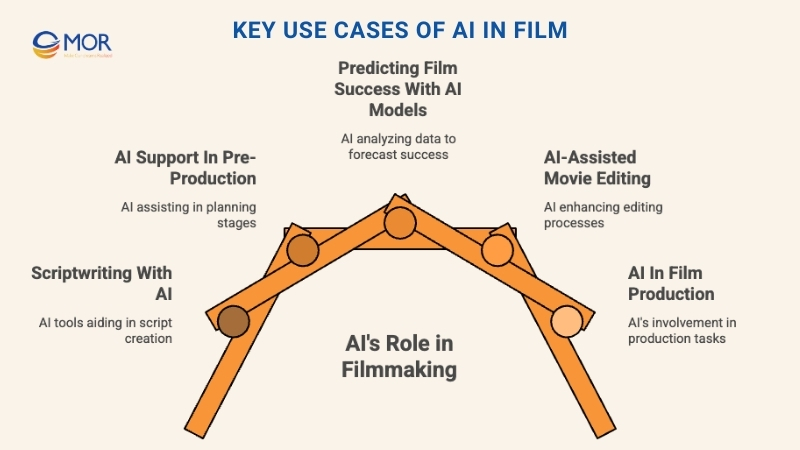
Scriptwriting With AI
Filmmakers are increasingly adopting AI to speed up and refine script development. By training algorithms on vast databases of existing screenplays, systems can generate original scripts that reflect proven storytelling patterns. This helps writers and studios save time while producing narratives that align with audience expectations.
AI also supports evaluation by scanning draft scripts, identifying gaps in character development, and flagging potential story weaknesses. These tools don’t replace creative storytelling but instead act as accelerators, showing how AI in entertainment can simplify early production workflows within the AI in the entertainment industry.
AI Support In Pre-Production
Pre-production is often one of the most complex stages in filmmaking, requiring careful coordination of schedules, locations, and resources. Intelligent systems now assist production teams by automating key tasks. They can analyze project timelines to predict how long scenes will take to film, suggest optimal locations using virtual exploration tools, and break down scripts into actionable elements for planning.
While the creative vision of producers and directors remains essential, AI ensures logistics are smoother and less time-consuming. This balance of efficiency and creativity underscores how will AI affect the film industry, highlighting its growing influence before cameras even start rolling.
Predicting Film Success With AI Models
Studios are now relying on predictive systems to estimate how well a movie might perform financially. By analyzing scripts and comparing them with past box office data, AI tools can forecast potential earnings. While these predictions are not flawless, they are increasingly trusted by major film companies.
Warner Bros., for example, uses the Cinelytic platform to generate revenue projections, while 20th Century Fox applies its Merlin system to connect upcoming films with target audiences and deliver demographic insights. Sony Pictures has also tested ScriptBook to evaluate dozens of its releases. These applications demonstrate the growing role of AI in entertainment examples, where data-driven forecasts influence decisions about which projects move forward.
AI-Assisted Movie Editing
Editing is another area where AI in entertainment is making its mark. Intelligent tools can scan hours of footage, detect emotionally charged or high-action sequences, and suggest highlights for trailers. IBM Watson showcased this potential by producing a trailer for the sci-fi film Morgan, proving how algorithms can accelerate the creative process.
Beyond previews, AI also supports full-length film editing. Systems equipped with facial recognition identify main characters and key plot moments, streamlining how scenes are pieced together. While editors still provide the artistic touch, AI reduces repetitive tasks and shortens production cycles, showcasing how an AI production company can merge efficiency with creativity in filmmaking.
AI In Film Production
Artificial intelligence is no longer limited to support roles, it is now stepping directly into film creation. A striking example came when Benjamin AI, working with writer Ross Goodwin, produced the science fiction short Zone Out in just 48 hours. While the film itself wasn’t a blockbuster, it highlighted how algorithms can automate parts of the creative process once thought untouchable.
From script generation to editing and production management, AI in entertainment continues to expand its influence. For studios and independent creators alike, these tools reduce costs, accelerate timelines, and open new opportunities to monetize stories, reinforcing how deeply AI in the entertainment industry is reshaping moviemaking.
Gaming
Gaming has become a proving ground for AI in the entertainment industry, where smart systems drive more immersive worlds, adaptive challenges, and personalized play experiences.
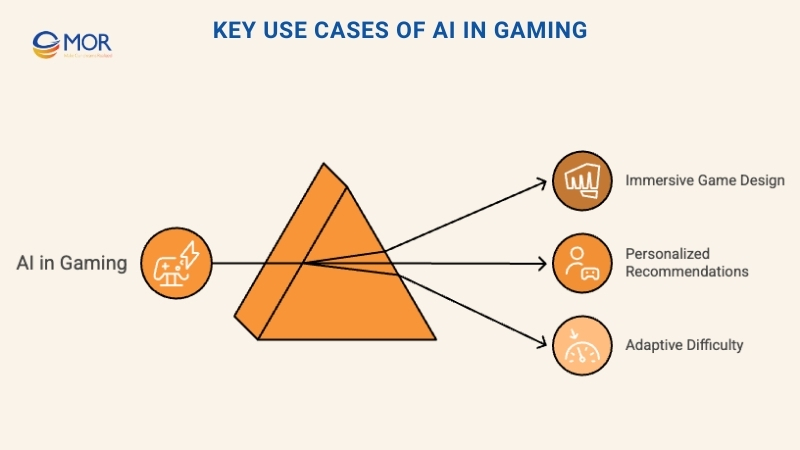
AI In Game Design And Gameplay
Modern gaming demonstrates how deeply AI in entertainment can transform creative design. Intelligent systems now drive non-player characters (NPCs), giving them realistic reactions and complex behaviors that make games feel more alive. Developers also use AI to refine core mechanics, ensuring gameplay is both challenging and dynamic.
Beside interaction, algorithms can generate procedural content such as maps, levels, and even entirely new characters. This ability to create fresh environments on demand keeps titles engaging for longer, showing the value of AI in entertainment examples within the gaming world. Players benefit from richer storylines, smarter opponents, and constantly evolving challenges.
Personalized Game Recommendations
Personalization is equally powerful in gaming. AI analyzes each player’s habits, preferred genres, and past choices to suggest titles that align with their interests. This extends beyond recommendations alone. Algorithms can tailor missions, side quests, or challenges within a game based on real-time behavior.
For example, adaptive quests may appear if a player prefers exploration over combat, ensuring the experience feels unique to them. This predictive approach not only strengthens engagement but also keeps users loyal over time. It highlights how personalization in AI in media industry enhances entertainment value by delivering one-of-a-kind experiences built for individual players.
Adaptive Difficulty Through AI
Adaptive difficulty has become a defining feature of modern gaming, showing how AI in entertainment can personalize experiences in real time. By analyzing factors such as player skill, reaction speed, decision-making style, and overall progress, AI dynamically adjusts the challenge level. When a player advances quickly, the system increases complexity to keep engagement high.
Conversely, if the player struggles, the difficulty is eased to prevent frustration. This balance, known as dynamic difficulty adjustment (DDA), ensures gameplay remains both accessible and rewarding. More than just a feature, it reflects the broader role of AI in media and entertainment in creating tailored experiences that match individual abilities and preferences.
Advertising
In advertising, AI is unlocking new levels of precision. From smarter targeting to predictive analytics, it helps brands connect with audiences in real time.
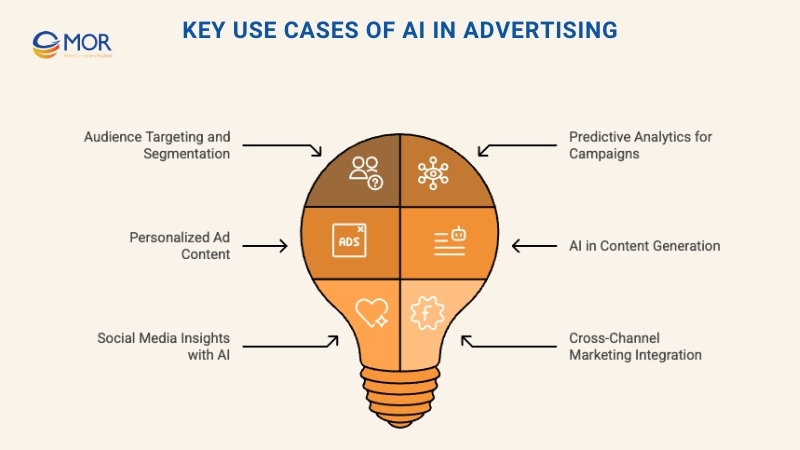
Audience Targeting And Segmentation
Marketers in the AI in entertainment space are using intelligent tools to refine how ads reach viewers. By analyzing large volumes of data, AI can predict behavior patterns and segment audiences with precision. Campaigns can then be customized to reflect user interests, demographics, or viewing habits in real time.
This approach not only improves personalization but also streamlines testing, helping advertisers quickly identify what resonates most. The result is more effective campaigns that feel customer-focused, a clear advantage of AI in the entertainment industry.
Predictive Analytics For Campaigns
AI-powered predictive analytics brings foresight into advertising strategy. Through studying historical data, these systems forecast future trends, from content preferences to likely purchase behavior. Advertisers can use these predictions to determine the best timing for placements and select platforms where engagement will be highest.
This data-driven accuracy maximizes reach and budget efficiency, proving how innovation entertainment strategies are now shaped by AI’s ability to anticipate consumer decisions.
Personalized Ad Content
Personalization has become a cornerstone of AI in entertainment marketing strategies. Intelligent systems analyze user behavior, preferences, and engagement history to deliver content that feels tailor-made.
From recommending the next show to watch to suggesting in-game purchases, these targeted experiences increase interaction and drive higher conversion rates. Making ads more relevant and less intrusive, personalization strengthens brand loyalty and reflects the growing value of AI use cases in media and entertainment.
AI In Content Generation
Automation is also transforming how creative assets are produced. With AI tools, companies can generate ad copy, social posts, and even full-length articles in a fraction of the time once required. These systems scan audience data and apply language models to craft content that fits brand tone and campaign goals.
The outcome is faster production, reduced costs, and campaigns that maintain consistency across platforms. For marketers, this efficiency proves how AI in media is not only streamlining workflows but also enhancing the creative process itself.
Social Media Insights With AI
In the era of digital engagement, AI in entertainment also plays a major role in how brands monitor and adapt their social presence. AI-powered tools track mentions, trending topics, and campaign performance in real time. By applying advanced analytics, businesses can see what resonates with audiences and what needs adjustment.
This allows companies to refine their strategies, respond faster to shifts in conversation, and measure online reach more accurately. Such precision reflects the growing importance of AI in media and entertainment for maintaining a strong, data-driven presence on social platforms.
Cross-Channel Marketing Integration
Advertising no longer depends on a single platform, and AI ensures every channel works in harmony. By integrating insights from TV, streaming services, social media, and digital ads, intelligent systems create a unified view of the customer journey. This allows advertisers to coordinate campaigns with greater efficiency and deliver consistent messaging across touchpoints.
For marketers, this capability shows how AI in media industry supports more cohesive campaigns, maximizes engagement, and ensures resources are used effectively across all outlets.
Book Publishing
Even traditional publishing is being reshaped by AI, with tools that streamline editing, design, and distribution.
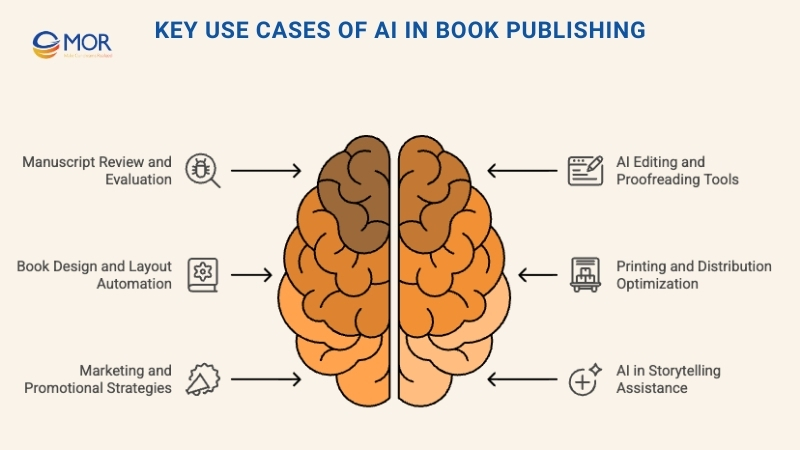
Manuscript Review And Evaluation
The path from manuscript to published book has always required careful review by editors and agents, who evaluate quality, market potential, and fit with a publisher’s catalog. Today, AI in entertainment and publishing is streamlining this process.
Intelligent systems can automatically screen submissions, classify manuscripts based on set criteria, and prioritize those with higher relevance. This saves publishers time, especially when managing thousands of entries.
Beyond sorting, predictive modeling tools use AI to analyze reader interests and market trends. By forecasting how a manuscript might perform, publishers gain valuable insights into its commercial potential. This data-driven approach supports more confident decision-making and helps align projects with audience demand.
AI also brings efficiency to tracking submissions and managing feedback. Editors can follow manuscripts through each stage of review, while automated tools organize comments for faster collaboration.
These capabilities not only improve internal workflows but also accelerate how quickly promising stories reach readers. In short, integrating AI into the submission and evaluation process enhances precision, reduces delays, and illustrates how AI in entertainment industry innovations are influencing traditional publishing practices.
AI Editing And Proofreading Tools
Editing and proofreading remain critical steps before any manuscript reaches publication. AI-driven platforms now accelerate this stage by detecting grammar, spelling, and formatting errors with high accuracy. These systems also check adherence to style guides, ensuring consistency across tone, structure, and presentation.
In addition to corrections, AI evaluates clarity and readability, suggesting adjustments to sentence flow for better comprehension. Tools further assist with version control, making it easier for editors to manage multiple drafts.
Automating repetitive tasks, AI improves accuracy and reduces time spent on revisions. This shows how AI in entertainment examples extend into publishing, where intelligent systems reinforce quality and efficiency.
Book Design And Layout Automation
Design shapes how readers experience a book, from covers to interior formatting. Traditionally the work of graphic designers, many of these tasks now benefit from AI-powered design software. Intelligent tools provide font recommendations based on genre, apply layout templates, and even use predictive analytics to guide stylistic choices that fit market trends.
These capabilities speed up the design process while supporting creative decisions. Real-time feedback and collaboration features also enhance team workflows, ensuring smoother approvals between designers and publishers. The outcome is professional, polished books produced faster. As part of the broader influence of AI in media industry, design automation reflects how technology and creativity now operate side by side.
Printing And Distribution Optimization
Once a manuscript is finalized, distribution moves forward through two main channels: physical printing for bookstores and digital release as eBooks. Each path involves logistics, inventory control, and coordination with retailers or platforms. Here, AI delivers significant value.
Predictive analytics help optimize supply chains, ensuring books are produced and shipped efficiently. Automated inventory tracking reduces risks of surplus or shortages, giving publishers better cost control. For digital formats, data-driven tools identify which eBook platforms will deliver the widest reach to the target audience.
On top of this, AI-powered chatbots support customer service by handling inquiries, managing orders, and resolving distribution issues faster. These advancements illustrate how AI in entertainment and publishing align to improve operational precision in both print and digital markets.
Marketing And Promotional Strategies
Connecting books with readers depends on effective marketing campaigns. Authors and publishers develop launch events, craft promotional content, and engage audiences through social media and ad placements. AI strengthens these efforts by streamlining campaign management, pinpointing audiences through detailed data analysis, and recommending the best timing for ad placements.
Real-time analytics also help measure campaign success and adapt strategies quickly. Tools can highlight emerging trends, refine messaging, and ensure promotions remain relevant. By improving visibility and driving higher sales, AI demonstrates its expanding role in AI in the entertainment industry, where marketing is both creative and data-driven.
AI In Storytelling Assistance
Storytelling remains at the heart of publishing, and AI in entertainment is now a powerful ally in shaping narratives. Intelligent tools process large datasets to suggest character arcs, refine plot structures, and highlight patterns that resonate with audiences.
Writers can also draw on sentiment analysis and emotion-detection systems to gauge how scenes might affect readers, adjusting tone or dialogue for stronger impact. These capabilities help authors craft stories that connect more deeply while maintaining originality.
Guiding creative choices with data-driven insights, AI shows how AI in media and entertainment supports both efficiency and emotional engagement in modern storytelling.
Content Creation
The rise of AI in media and entertainment is giving creators powerful ways to personalize, moderate, and classify content at scale.
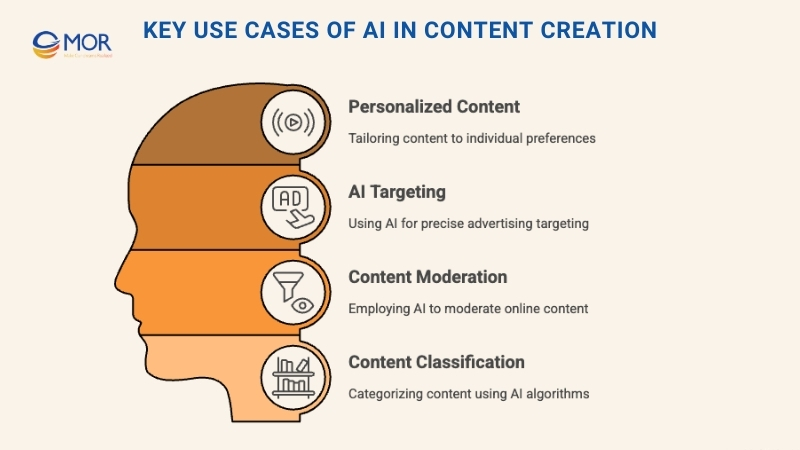
Personalized Content And Recommendations
Personalization is one of the strongest contributions of AI in entertainment. Machine learning algorithms scan viewing habits, listening patterns, and demographic details to deliver tailored suggestions across streaming services and music platforms.
Whether recommending the next film, album, or series, these systems ensure content aligns with individual preferences. This not only boosts user engagement but also gives companies in the AI in media and entertainment space a competitive edge, as they attract larger audiences and keep them returning for more.
Making recommendations highly relevant, businesses enhance satisfaction and strengthen loyalty.
Online Advertising With AI Targeting
Advertising has become more precise with AI-driven platforms like Google AdSense and AdWords. These systems evaluate browsing histories, search behavior, and personal interests to deliver ads that reach the most receptive audiences. For publishers and brands, this targeted approach improves efficiency by reducing wasted impressions and maximizing conversions.
For consumers, it creates a less intrusive and more relevant ad experience. This ability to pair marketing with accurate audience insights reflects how AI in media is transforming online promotion, turning digital advertising into a more measurable and impactful part of the entertainment ecosystem.
AI For Online Content Moderation
The diversity of digital media means platforms must manage not only engaging material but also content that may be inappropriate or offensive. AI in entertainment supports this task by detecting, filtering, and categorizing online content in real time. Automated moderation systems can identify language, imagery, or behavior that requires restriction, ensuring unsuitable material is flagged before reaching broader audiences.
These systems also evaluate user data such as age or gender to deliver appropriate content, helping services comply with regulatory standards. Safeguarding younger audiences and maintaining community guidelines, AI ensures that AI in entertainment industry platforms remain safer and more reliable.
Content Classification And Categorization
Accurate categorization is critical for content discovery on streaming platforms. AI tools now scan scenes, objects, and metadata to organize shows and films into the right genres and themes. This allows platforms to recommend content not only by title but also by cast, crew, or narrative elements.
The process enhances search accuracy and makes libraries easier for users to navigate. By streamlining classification and improving recommendation quality, AI reinforces how AI in media industry helps platforms deliver intuitive, personalized discovery experiences that keep audiences engaged.
MOR Software's AI Development Services For Entertainment Enterprises
At MOR Software, we help media and entertainment enterprises apply AI where it delivers real business results. Our teams combine expertise in mobile, web, and cloud development with practical experience in building AI-driven platforms for publishers, broadcasters, and entertainment brands.
We design custom AI solutions that range from content personalization systems for streaming and news apps, to predictive analytics tools that forecast audience demand and advertising performance. With ISO 9001:2015 and ISO 27001:2013 certifications, security and compliance are embedded in every stage of development.
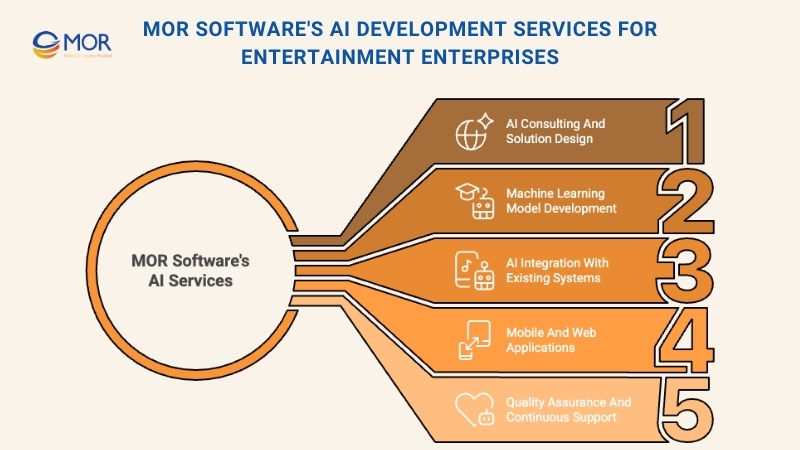
Our service portfolio includes:
- AI consulting and solution design to identify the right use cases in content creation, marketing, and user engagement.
- Machine learning model development for recommendation engines, natural language processing, and predictive forecasting.
- AI integration with existing systems such as CMS platforms, streaming apps, and customer engagement tools.
- Mobile and web applications powered by AI, designed to deliver interactive and scalable user experiences.
- Quality assurance and continuous support, ensuring every system remains accurate, secure, and aligned with evolving user behavior.
We have delivered projects like digital news platforms, healthcare media apps, and collaborative entertainment solutions, proving our ability to build systems that scale to millions of users. Whether it’s automating video editing, tagging large content libraries, or generating real-time recommendations, we create AI-powered solutions that let enterprises stay ahead in a fast-changing industry.
Key Benefits Of AI In Entertainment
The advantages of AI in entertainment are wide-ranging, reshaping how audiences interact with content and how companies deliver it. From personalization to efficiency, intelligent systems continue to push the industry forward in measurable ways.
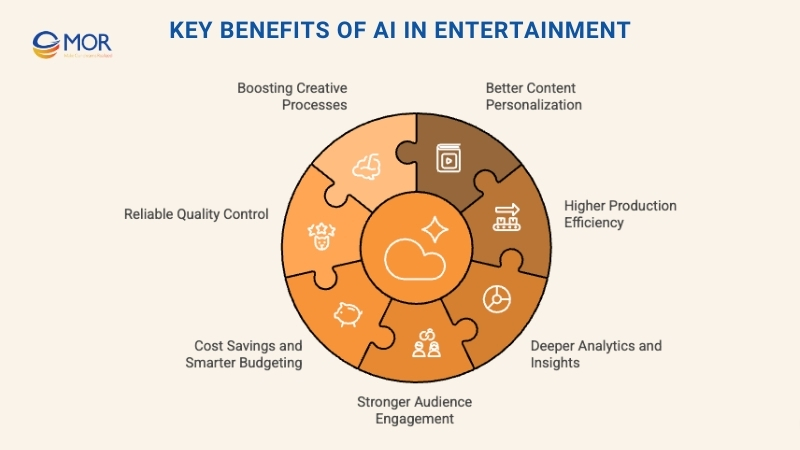
Better Content Personalization
A standout benefit of AI in the entertainment industry is its ability to deliver deeply personalized recommendations. Algorithms review a user’s past activity, preferences, and viewing habits to suggest movies, shows, or music that feel tailored to them. Leading platforms like Netflix, Amazon Prime, and Spotify rely on these systems to keep users engaged.
This personalization improves satisfaction by introducing audiences to content they may not have discovered otherwise, broadening exposure to niche genres or emerging artists. It also increases retention rates, as users are more likely to return when the platform consistently delivers relevant choices. The effect is twofold: customers enjoy a smoother experience, and companies gain loyalty while attracting new subscribers.
These data-driven recommendations are more than just conveniences. They demonstrate how AI in media industry transforms discovery into an interactive and enjoyable process. By elevating engagement, AI helps platforms expand their reach and strengthen competitive positioning in a crowded marketplace.
Higher Production Efficiency
One of the most practical advantages of AI in entertainment is how it streamlines production workflows. Intelligent tools automate repetitive, time-intensive tasks such as script breakdown, video editing, and visual effects. By taking over these processes, AI allows creative teams to focus on artistic direction and storytelling rather than technical bottlenecks.
In post-production, AI-enabled platforms handle sound editing, color correction, and even scene matching with speed and precision. These tools ensure greater consistency across projects while reducing the likelihood of human error. For studios, this translates into shorter production timelines and improved overall quality.
Beyond efficiency, automation also drives cost savings. By delegating labor-intensive work to AI, resources can be reallocated to strategic areas like marketing or creative development. The result is a more balanced and sustainable production model. This reflects how AI in media and entertainment is not just a tool for innovation but also a critical enabler of faster delivery and higher-quality outcomes in modern content creation.
Deeper Analytics And Insights
Understanding audience behavior is central to producing content that resonates, and AI in entertainment provides unmatched analytical power. By processing massive datasets from streaming platforms, social media activity, and viewer feedback, AI uncovers patterns that might otherwise go unnoticed. These insights give creators a clearer picture of what audiences value most.
With predictive capabilities, AI can highlight emerging trends, estimate viewer preferences, and even forecast how well upcoming content might perform. This enables studios and production companies to make smarter investments, focusing resources on projects with higher chances of success. For marketers, these insights refine campaign strategies, ensuring messages connect with the right demographics.
Such analytics extend beyond numbers, they shape creative decisions and production planning. By linking audience data to storytelling choices, studios can balance creative vision with audience demand. This integration of creativity and intelligence shows how AI in the entertainment industry is driving more confident decision-making and delivering content that both captivates viewers and meets business objectives.
Stronger Audience Engagement
Another clear benefit of AI in entertainment is its ability to keep audiences engaged through immersive and interactive experiences. By combining technologies like augmented reality (AR), virtual reality (VR), and AI-powered chatbots, content providers can deliver environments where users feel actively involved rather than passively consuming.
In gaming and virtual platforms, AI generates adaptive storylines that shift based on user decisions, creating unique narrative paths. This interactivity gives users control over the experience, making it more personal and memorable. Chatbots further extend engagement by offering real-time interactions, answering questions, or guiding users through entertainment ecosystems.
The result is longer engagement times and stronger connections with the content. Whether through immersive VR journeys or tailored interactions, AI in media industry ensures audiences stay invested, transforming entertainment into an interactive exchange rather than a one-way experience. This deeper involvement strengthens loyalty and builds lasting impressions for both platforms and creators.
Cost Savings And Smarter Budgeting
One of the most practical advantages of AI in entertainment lies in reducing costs while improving budget allocation. Automating repetitive and labor-heavy tasks, intelligent systems cut down on staffing needs for areas like editing, script breakdown, or asset management. This efficiency not only saves time but also minimizes the risk of costly human errors.
AI-driven predictive analytics provide even greater value during planning. By analyzing past project expenses, box office data, and current market trends, studios can forecast both costs and potential returns more accurately. These forecasts help production teams allocate resources where they matter most, avoiding overspending on less impactful elements.
The result is smarter financial management across the production cycle. Producers gain better control over expenditures, investors see more reliable returns, and projects maintain profitability without sacrificing quality. This financial discipline reflects how AI in media and entertainment strengthens both creativity and sustainability, ensuring projects remain viable in a competitive industry.
Reliable Quality Control
Delivering high-quality content has always been a priority in the entertainment sector, and AI in entertainment now plays a central role in achieving this. Intelligent systems assist with quality assurance by identifying and correcting errors at both production and post-production stages.
For example, AI algorithms can scan audio and video files to detect anomalies that might affect clarity or consistency. Flagging these issues early, creators can ensure the final product meets professional standards. The technology also helps maintain continuity, a task often difficult in large-scale productions. In film, AI tools track details such as settings, character appearances, and props across multiple scenes. This oversight prevents continuity mistakes that audiences would notice and keeps the storytelling seamless.
Through automating error detection and consistency checks, AI not only raises production quality but also saves valuable time for creative teams. These improvements reflect how AI in the entertainment industry safeguards artistic vision while guaranteeing technical precision, resulting in content that feels polished and professional.
Boosting Creative Processes
Beyond efficiency, AI in entertainment is also fueling creativity by giving artists and creators new ways to experiment. Musicians, writers, and visual artists now use AI-powered platforms to generate fresh ideas, test new formats, or spark inspiration when facing creative blocks.
Algorithms can compose original melodies, draft scripts, or even create visual art, providing a foundation that creators can refine. In film, AI highlights proven storytelling techniques and patterns, guiding directors and writers toward narratives that resonate with audiences. These insights don’t replace creativity but act as a partner in shaping compelling stories.
Animation is another area where AI demonstrates value. Intelligent systems can build realistic character movements and scenes more quickly, freeing up animators to focus on fine details and artistic choices. By blending automation with imagination, AI in media and entertainment expands creative possibilities while reducing repetitive workload, making it a valuable collaborator in the modern creative process.
Real-World Examples Of AI In Entertainment
Real-world projects show how AI in entertainment is already reshaping industries. From gaming to live events, leading brands are proving its power with measurable results.
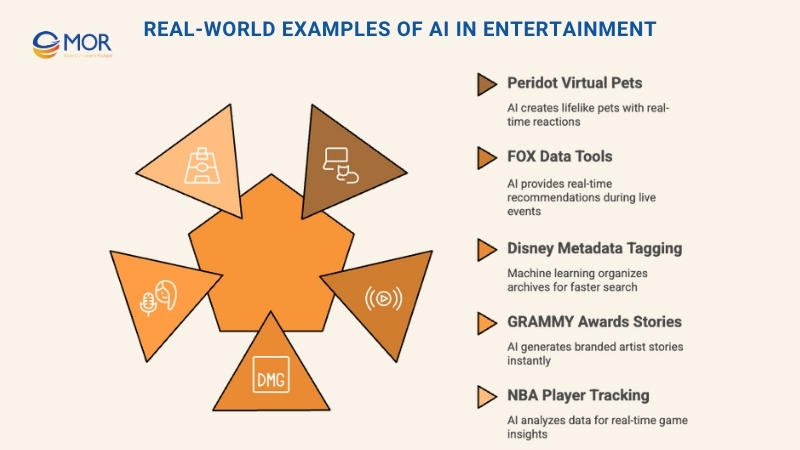
1. Peridot
Virtual pets have captured the imagination of players since the days of Tamagotchi and Neopets, and the tradition continues with Niantic’s augmented reality game Peridot. To make its creatures, known as Dots, feel more lifelike, Niantic integrated Meta’s Llama generative AI model. The result was a leap forward in interactivity for AI in entertainment.
Instead of relying solely on pre-programmed behaviors, the system generates actions and reactions in real time. Each Dot adapts and evolves as it “learns” from interactions, creating more authentic and unpredictable responses. This level of variety would have required countless hours of manual programming in the past. With generative AI, characters can act beyond the boundaries of developer-defined rules, offering richer engagement for players.
The Peridot team described the project as an early look at how designers can use AI to make in-game characters more responsive and emotionally engaging. It highlights how AI in the entertainment industry can deepen immersion and expand creative possibilities in gaming.
Results
- Eliminated the need for developers to manually code every reaction
- Produced distinctive, surprising responses from virtual pets
- Allowed reuse of a large animation library that was previously hard to implement
2. FOX
For years, media companies relied on surveys to learn what audiences wanted to watch. These methods were often slow, limited, and prone to inaccuracies. With the rise of AI in entertainment, FOX has moved beyond traditional surveys by adopting advanced, real-time data tools.
FOX implemented Amazon’s AI-powered solutions, including SageMaker, Personalize, Bedrock, and Titan, to analyze viewer data instantly. These platforms generate dynamic recommendations for audiences, helping users discover shows that match their interests. At the same time, they deliver valuable insights to broadcasters, enabling programming decisions to be made during live events.
Sports coverage is one area where the technology shines. AI automatically compiles highlights while games are in progress, giving fans immediate recaps and broadcasters material to enrich commentary. Advertisers also benefit, as the system identifies optimal moments to insert ads that align with their brand messaging. This ensures promotions feel timely and relevant, reflecting how AI in media industry connects audience experience with commercial goals.
FOX leadership has emphasized that large language models now make it possible to move directly from observation to actionable products, transforming how data is used in real time.
Results
- Delivered automated, real-time highlight reels for live sports
- Enabled precise ad placements at moments most relevant to products
- Provided sportscasters with instant insights on players and referees
3. Disney
Disney has always been recognized as a technology pioneer, from the earliest Mickey Mouse animations to its modern franchises. Over decades, the company built an enormous library of content, but managing and accessing this archive became increasingly complex. To solve this challenge, Disney partnered with AWS to introduce AI-driven metadata tagging across its entire catalog, showing another practical use of AI in entertainment.
Using machine learning, the system learned from human input to tag everything, characters, movements, settings, and even behaviors. This tagging allows illustrators to quickly retrieve a specific character pose or animators to search for a particular scene. Writers can also use the system to check how often a certain action or storyline element has occurred in a series, helping them avoid repetition and maintain originality.
The tagging process continuously adapts to Disney’s evolving content, from new superheroes and weapons to sports coverage and fresh shows. This flexibility highlights how AI in media and entertainment supports not only creativity but also operational efficiency by making massive libraries instantly searchable.
Results
- Delivered granular metadata tagging across extensive archives
- Enabled creators to quickly locate content through a searchable interface
- Applied the model beyond animation, including sports, to refine content recommendations
4. GRAMMY Awards
The GRAMMY Awards, produced by the Recording Academy, stand as one of the largest annual events in music. Thousands attend in person, while millions more follow along online. With nearly 1,000 nominated artists and constant updates during the live show, the editorial team faced a major challenge: how to deliver dynamic, real-time stories for fans without overwhelming their resources. The solution came through AI in entertainment.
To meet this demand, the Recording Academy collaborated with IBM to implement generative AI tools. By combining IBM’s technology with the Academy’s data, the system generated branded, high-quality stories on winners within seconds. This ensured fans could see updates about their favorite artists almost instantly, while the editorial team focused on oversight and final edits rather than writing from scratch.
The AI-powered system was able to push content directly to the official website and social platforms as the show unfolded, keeping digital audiences engaged at every moment. As Recording Academy leadership noted, these digital-first experiences now define a brand as much as the live event itself.
The project illustrates how AI in the entertainment industry not only enhances creative output but also streamlines large-scale operations under tight deadlines.
Results
- Published over 200 artist stories with instant, AI-generated content
- Accelerated publishing through IBM’s AI Content Builder dashboard
- Delivered real-time updates across the website and social media channels during the event
5. NBA
The NBA has always sought new ways to deepen fan engagement, and its stats team found a solution in AI in entertainment powered by Microsoft Azure. By applying AI to live player tracking, the league can now deliver real-time insights that captivate audiences beyond the scoreboard.
Every season, 30 teams and over 500 players compete in 82 games each, generating millions of data points per game. Using a computer vision-based system, the NBA collects information on player movements, dribbling speed, dunk height, passing patterns, and even injury risk. The challenge was processing this immense volume of data quickly enough to share it with fans during live games.
To handle the workload, the NBA leveraged Azure Kubernetes Service (AKS) to run and scale AI models seamlessly. The processed data was then visualized through a real-time 3D model, giving the stats team an intuitive way to analyze player performance as it happened. For fans, this translated into a richer viewing experience, with detailed stats that enhanced their understanding of the game.
This project demonstrates how AI in media and entertainment transforms sports into interactive storytelling, combining data science with fan passion to create an immersive connection between the audience and the athletes they follow.
Future Trends Of AI In Entertainment And Media
The entertainment industry continues to evolve alongside emerging technologies and shifting audience expectations. Looking ahead, AI in entertainment will play a major role in shaping future experiences, with innovations in immersive formats, personalization, and automation.
One of the most prominent trends is the expansion of virtual and augmented reality (VR and AR). As these technologies mature, audiences will enjoy more interactive experiences, from VR concerts and esports to AR-enhanced films and television. Instead of simply watching, viewers will have opportunities to step into story worlds, explore environments in greater depth, or even influence how a narrative unfolds. These advancements reflect how AI in the entertainment industry and immersive media are merging to redefine audience participation.
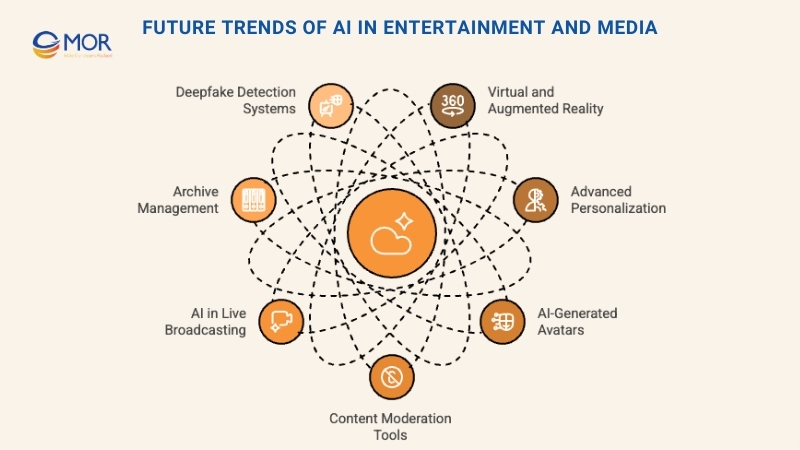
Personalization will also continue to grow in importance. Streaming platforms like Netflix and Amazon Prime already use algorithms to suggest content based on viewing history. In the near future, even more companies will adopt these methods, refining recommendations, tailoring ads, and creating dynamic experiences built around individual preferences. This ability to adapt content delivery demonstrates the ongoing value of AI in media industry strategies.
We can also expect new types of digital presenters. AI-generated avatars and virtual anchors will deliver news, entertainment, and even localized content in multiple languages. These avatars will provide lifelike interactions, making broadcasts feel more personal and accessible.
Content moderation will remain a priority as digital platforms face the challenge of managing vast amounts of user-generated material. AI-powered moderation tools will serve as essential gatekeepers, detecting harmful or inappropriate content quickly to ensure safe and responsible engagement online.
In live broadcasting, AI will take on critical functions such as automated closed captioning, real-time graphics, and interactive overlays for sports and news. These improvements will enhance both accessibility and production value. Similarly, media companies will rely on AI for advanced archive management, where categorization and tagging tools will make decades of historical content easier to search and repurpose.
Finally, as deepfake technology grows more sophisticated, AI will also be essential for building detection systems. These solutions will help identify manipulated media and protect the authenticity of digital content. Together, these innovations illustrate how AI in entertainment examples will continue to drive innovation, blending creativity with responsibility to meet future demands.
Conclusion
The rise of AI in entertainment is transforming how content is created, delivered, and experienced across music, film, gaming, publishing, and live events. From personalization to predictive analytics, its benefits span creativity, efficiency, and engagement. To capture these opportunities, enterprises need trusted partners who understand both technology and industry demands. MOR Software specializes in building secure, scalable AI solutions for media and entertainment. Contact us today to explore how we can power your next innovation.
MOR SOFTWARE
Frequently Asked Questions (FAQs)
What is the future of AI in entertainment?
AI is reshaping media and entertainment worldwide, and analysts expect the market to hit nearly US$99.5 billion by 2030. As production teams adopt AI to boost efficiency and streamline creative processes, businesses are rapidly integrating these technologies to stay competitive.
What is the AI in Netflix entertainment?
In the Netflix original The Eternaut, generative AI was used to produce a building collapse scene in Buenos Aires. This approach delivered results about ten times faster than traditional special effects, saving costs that would otherwise have been out of reach for the show’s budget.
How is AI used in kpop?
K-pop groups rely on AI for visual and musical creativity, designing artwork for albums and singles while also experimenting with virtual performers. These AI-generated characters sing, dance, and perform, guided by human creators who fine-tune the final production.
Is AI being used in movies?
Filmmakers increasingly apply AI for tasks like script development, editing, and creating special effects. The use of these tools is gaining recognition, with events such as the AI Film Festival highlighting creative achievements made possible through artificial intelligence.
How is AI used in entertainment?
AI helps classify and recommend movies and shows by scanning visual elements, scenes, and metadata. This automation improves genre tagging and makes it easier for audiences to discover content tailored to their preferences.
Which AI is best for entertainment?
Tools such as Scriptbook and HyperWrite show strong potential in entertainment. They analyze existing scripts to identify themes and structures, then generate storylines that align with industry standards in scriptwriting and narrative design.
Does Spotify use AI?
Spotify applies Natural Language Processing to read online information about songs and artists. The system uses this data to categorize music accurately and enhance recommendations, improving how users discover tracks that match their tastes.
Is Netflix making AI movies?
Netflix has confirmed its use of generative AI in productions like The Eternaut, where AI took over some VFX work. According to executives, this method cut production time dramatically and reduced costs compared to traditional effects workflows.
Are singers using AI?
AI has become part of the music creation process, with about 60% of musicians now using it for tasks such as production, mastering, and visual design. These tools assist artists in shaping their work and enhancing overall output.
Can AI replace film actors?
AI technology now makes it possible to digitally replace human actors in films. While this introduces opportunities for cost savings and creative experimentation, it also raises serious ethical debates about authenticity and the future of acting as a profession.
How is AI used in music?
Producers employ AI to generate different versions of a track based on style prompts. These tools help artists experiment with variations that align with the sound or mood they want to achieve.
Which films have used AI?
AI has been involved in the production of several films, including Emilia Pérez, The Brutalist, Civil War, The Irishman, Late Night with the Devil, and titles within the Star Wars franchise, often contributing to effects and post-production.
Will AI overtake artists?
It is unlikely that AI will fully replace artists, but it is becoming a valuable creative partner. Artists use AI as a tool to push artistic boundaries, explore new mediums, and evolve their craft in innovative ways.
How to use AI for entertainment?
AI supports entertainment in many areas: personalizing recommendations, generating voiceovers, assisting with dubbing, moderating content, powering immersive experiences, analyzing audience sentiment, and driving fan engagement across platforms.
What are the negative effects of AI in entertainment?
One of the major concerns is the rise of deepfakes. AI-generated media can convincingly alter appearances, voices, and actions, creating risks of deception and misuse that challenge trust in entertainment content.
What does AI do in entertainment?
AI enhances how content is made and consumed, from automating production tasks to tailoring user experiences with personalized recommendations. It also strengthens audience interaction, making entertainment more engaging and adaptive.
Does YouTube use AI?
Yes. YouTube applies AI systems to detect content that may break its Community Guidelines. Machine learning models review uploads at scale, and human moderators step in to confirm violations and ensure fair enforcement.
What are some examples of AI in entertainment and media?
AI is widely used in visual effects and post-production. Adobe Sensei, for example, can automate editing, color correction, and even facial recognition. These tools have been applied to tasks like digitally aging or de-aging actors in films such as The Irishman.
How is AI used in concerts?
Concert organizers use AI to generate visuals that shift in real time with the performance. By analyzing music, stage movement, and crowd energy, the system ensures the visuals remain synchronized with the live show.
Can AI create a full movie?
Yes. Platforms like Invideo AI can transform a script into a feature-length film by generating characters, adding voiceovers, syncing subtitles, and layering sound effects and background music.
Will AI remove actors?
Although AI can simulate performances, it cannot replace the emotional depth and authenticity of human actors. Storytelling still depends on human creativity and connection, which ensures actors remain at the heart of the industry.
Rate this article
0
over 5.0 based on 0 reviews
Your rating on this news:
Name
*Email
*Write your comment
*Send your comment
1